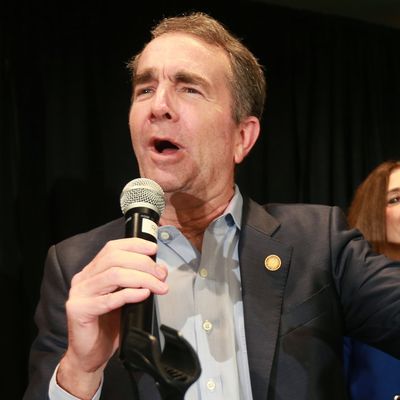
For the first time in a quarter century, the Democrats boast full control of the Virginia state government. Now, once Ralph Northam & Co. finish celebrating their triumph in Tuesday’s elections, they’ll turn their attention to the massive backlog of progressive policy proposals that have accumulated over decades of (at least partial) Republican rule.
There is much work to be done: abortion restrictions to roll back, Medicaid work requirements to scrap, a minimum wage to raise, gun-safety reforms to pass, and an Equal Rights Amendment to ratify. Although Virginia Democrats should be able to make good on most of their agenda items if they put their noses to the grindstone (and keep their leadership’s past indiscretions out of the headlines), some priorities will need to be set.
And bolstering the state’s long-suffering labor movement should be one of them.
Virginia is currently one of the most anti-union states in the country. Old Dominion is one of only three states to explicitly bar all public-sector workers from bargaining collectively. It was also one of the first states to ever enact a “right to work” law — a policy that undermines organized labor by allowing workers who join a unionized workplace to enjoy the benefits of a collective-bargaining agreement without paying dues to the union that negotiated it. This encourages other workers to skirt their dues, which can then drain a union of the funds it needs to survive.
Virginia Democrats must put repealing these statutes at the top of their to-do list. Unlike some other progressive goals, liberating the union movement from the shackles of reactionary laws requires little technocratic planning. Ending right-to-work and extending collective-bargaining rights to public workers should be quick and easy. And yet, its impact for both Virginia workers, and the state’s Democratic Party, should be durable and profound.
In 2018, the anti-poverty organization Oxfam America set out to identify the best and worst places in the U.S. to work. They judged all 50 states (plus the District of Columbia) on the following criteria:
Wage policies: Has the state raised the minimum wage to help workers earn a living wage? Do localities have capacity to raise the minimum wage to accommodate higher costs of living?
Worker protection policies: Does the state provide protections at work for situations such as paid sick leave, pregnancy, and equal pay?
Right to organize policies: Does the state guarantee that workers have the right to organize and sustain a trade union?
Virginia came in dead last.
Making it easier for workers to organize would go a long way toward helping Virginia shed this shameful distinction. There is little question in the academic literature that right-to-work laws adversely impact unionization rates, or that unions secure their workers wage and benefit premiums — even as they put upward pressure on the wages of unorganized workers in related industries. In an age of inequality so massive and indefensible, it makes hedge-fund billionaires uncomfortable, no putatively progressive party can allow anti-union laws to remain on the books of a state it controls.
But Virginia Democrats also have purely self-interested reasons for prioritizing labor rights: Few other items on the progressive agenda would do more to strengthen the party’s grip on power.
Republicans have long understood this. Whenever the GOP wins a trifecta in a remotely purple state, it immediately sets about undermining labor rights. In 2017, the anti-tax crusader Grover Norquist argued that if right-to-work laws like Virginia’s are “enacted in a dozen more states, the modern Democratic Party will cease to be a competitive power in American politics.”
A 2018 study on the electoral impacts of so-called right-to-work laws lend some credence to Norquist’s musing. By examining how voter turnout changed before and after the passage of right-to-work in a given state’s border counties — and comparing those shifts to the control group of adjacent counties in non-right-to-work states — researchers from Boston University, Columbia, and the Brookings Institution found that right-to-work laws are associated with a 3.5 percent drop in the Democratic Party’s share of the presidential vote. The impact on down-ballot Democratic candidates was similarly adverse.
Meanwhile, the available evidence suggests that unions don’t merely make states more Democratic — they also make Democratic state governments more progressive. According to research from the Center for American Progress, U.S. states with high unionization rates tend to have more progressive systems of taxation, and more generous levels of social provision.
America’s newest “true blue” state has a lot on its plate. But repealing Virginia’s reactionary labor laws is a quick and easy way to make lasting and significant change for the state’s working people, while making future elections a bit easier for progressives to win. The Democrats’ new legislative majorities should put such legislation on Ralph Northam’s desk posthaste.






























